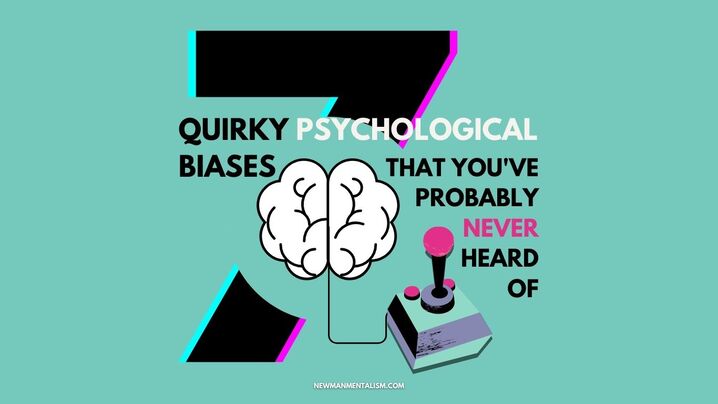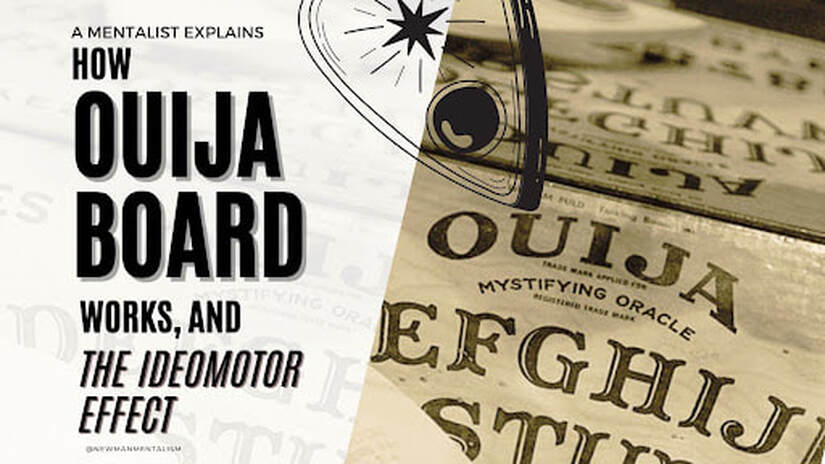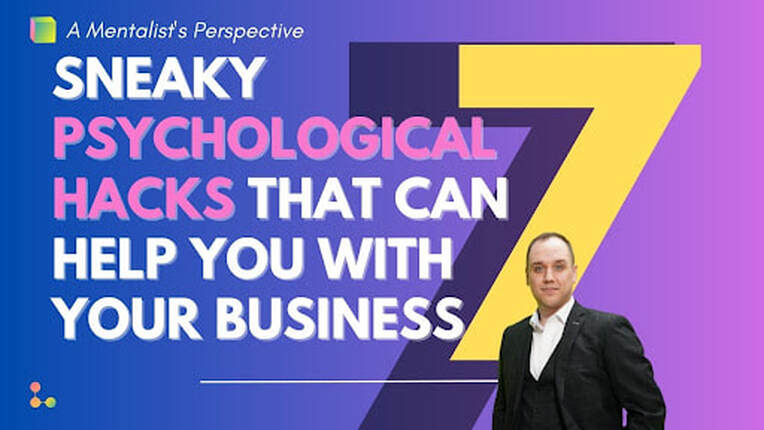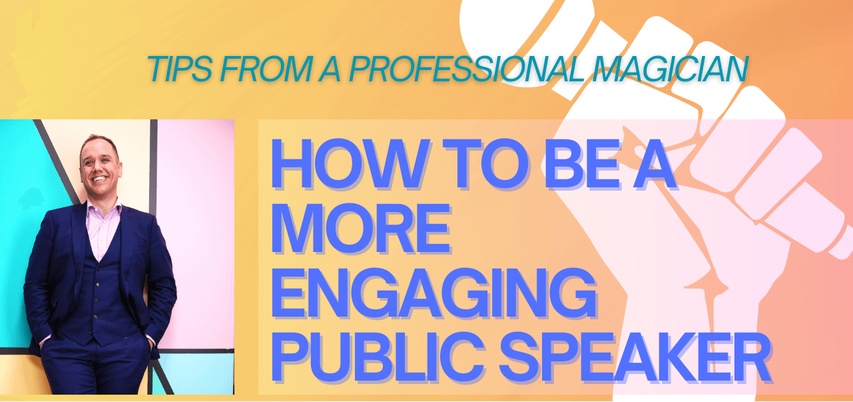|
Whether you’re a corporate professional in a high-profile company, a customer shopping around for the latest and greatest products, a student, a homemaker, or anything in between, there are a lot of things that can affect how we see and interact with the world.
We often overlook the psychological factors that influence our decisions. It's easy to believe that we make rational and objective choices, but the truth is that our minds are subject to countless biases and cognitive errors that affect our judgment. Some of these biases are well-known, such as confirmation bias and the halo effect, but others are lesser-known and more peculiar. So today, I want to explore seven quirky psychological biases that you've probably never heard of and how they can impact your work and life. 1. The Dunning-Kruger Effect The Dunning-Kruger effect is a cognitive bias in which people overestimate their abilities or knowledge. The effect was named after David Dunning and Justin Kruger, who conducted a study in 1999 that found that incompetent people often lack the skills to recognize their own incompetence. As a result, they overestimate their abilities and are more confident than competent individuals. This bias can manifest in the workplace when employees who lack competence believe they are performing well and resist feedback or training. 2. The IKEA Effect The IKEA effect is a cognitive bias in which people overvalue things they've invested effort into creating. The effect is named after the Swedish furniture company IKEA, which sells furniture in flat boxes that customers assemble themselves. Studies have found that people who assemble IKEA furniture rate it higher in quality and value than people who receive the furniture pre-assembled. This bias can apply to projects in the workplace when individuals value their contributions more highly because of the effort they've put into them. When I tell people I’m a mentalist, they correctly assume that I do what I do via a combination of methods: magic, psychology, and suggestion. Very real, tangible things that have very real, tangible explanations.
And that’s at least a little bit by design. I mostly perform for corporate audiences at private events, which are packed full of very savvy, intelligent people. Plus, the general population is a little more “on the ball” than previous generations, so pulling a fast one on today’s audiences is much more difficult than it was in the yesteryears before. What a lot of people don’t know is that a lot of mentalism effects of today originate from fraudulent psychics and mediums in the past. Many of their methods were adopted by magicians looking to add some mind-reading miracles to their act under the guise of being in cahoots with “spirits” or the “Great Beyond.” But where did that idea come from? How did the Spiritualism movement that inspired these fake mediums (which, in turn, inspired countless magicians and mentalists) adopt their methods? Well, I’m here to tell you the story. And it's a little bit spooky. Despite the lighting-fast development of AI, humans are still the best when it comes to creativity and innovation.
But daily tasks, deadlines, and office politics can often leave people feeling drained and uninspired. But what if I told you there was a simple solution to not only add some excitement and novelty to the workplace to fight off burnout but also help increase the creativity within you and your team? If you’re asking, “Jeff, what kind of magic is this that you speak of?” Well, um…it’s…it’s magic. Magic will help you do that. But how? Well, to help you understand, I’ve listed 5 reasons why magic can boost creativity and inspire innovation in you, your co-workers, your staff, your company, and your work environment. 1. The Power of Wonder: Do you remember how big and amazing the world felt when you were a kid? It seemed like anything was possible. And because of that, kids are incredibly creative. So, why not channel that as an adult? Awe and inspiration are key ingredients to unlocking creativity, and magic has a unique ability to create these emotions. Whether it’s through illusions, sleight of hand, or mind-bending tricks, magic transports us to a place where anything is possible, opening our minds to new and imaginative ideas. By incorporating magic into your team-building activities or meetings, you can break the monotony of the workday and create a sense of wonder and excitement, prime conditions for fostering creativity. I had a discussion about magic props with my mother recently that completely caught me by surprise.
"I'm trying to find an old Ouija Board." (which, by the way, has a super-interesting history.) "Are you out of your @#~!% mind?" was the response from my mom. (She probably didn’t ACTUALLY say that, but imagining a 72-year-old woman telling me I'm "out of my @#~!% mind" is hilarious, so we're gonna go with it. Sorry Mom.) My family isn’t big into the supernatural. I would classify my family as barely religious, maybe mildly superstitious, but that's about it. Ghosts, goblins, ghouls, and the like were always more-or-less dismissed as nonsense used to scare kids or entertain adults. So, I was surprised when my mom started to take a guarded interest in me searching out a Ouija board. Of course, I started to ask questions. My mom told me that when she was younger, she was at a sleepover with some girls from school, and one of them had brought a "talking board” with her. Of course, the teenage girls attempted to see if they could make contact with...well, something. Mom said that they had some garbled half-words appear, but for the most part, it was a very uneventful teenage seance. But after, when my mom started telling her family about the board (and how boring it was), things got weird. My mom’s aunt lectured them on how Ouija Boards are evil and they're vehicles for demons to take hold of you and use you for their bidding against the Holy Lord and Saviour. I realized that, as my mom told this story, this reaction from her aunt was more disturbing to her than the actual board itself. She told me this story as a warning: not so much against the evils of the Ouija Board itself, but the responses from people when you associate yourself with one. But this reaction is understandable, right? Because a lot of people think Ouija boards can be used to receive messages from the Great Beyond. But do Ouija boards actually send you messages? Well, in a way, yes. But they don’t come from the spirit world. Believe it or not, hiring a magician or a mentalist to entertain people at a corporate event is incredibly common.
In fact, some of the best mentalists and magicians in the world are ones that are rarely (if ever) seen on a public stage. They make their living by strictly being hired to do private events, company parties, conferences, fundraisers, and more. But a lot of people don’t realize that magic is not only a popular form of event entertainment but it’s also one of the best ways to make your next event the talk of the town. But why? Magic has been continually earning its place in the event industry due to its versatility, entertainment, engagement, and positive impact on guests. People often (incorrectly) think of magic as just somebody doing a few tricks. But magic is not just about identifying a card or pulling a rabbit out of a hat; it's about creating an engaging and unforgettable atmosphere that your guests will likely have never experienced before. Still don’t believe me? Well then, here are five reasons why a magic or mentalism show is the best entertainment for your corporate event, fundraiser, or gala. 7 Sneaky Psychological Hacks That Can Help You with Your Business - A Mentalist's Perspective24/7/2023 As a professional mentalist and magician, my entire career revolves around not only understanding human psychology but also how to manipulate it. And every year, I get to flex my psychology muscles and show off in front of crowds at company events, holiday parties, and more. And there are a few things I hear at these events often:
“Man, can you teach my sales guys how to get inside someone’s head?” “You should come to work for us!” “I wish I could do what you do…it would make my job so much easier!” From influencing people’s decisions to swaying opinions, there’s no denying the power that a little bit of psychology can wield. And not only can understanding human psychology be helpful to a mentalist on stage, but it can also be incredibly beneficial when it comes to succeeding in the business world. So today, this magician will be sharing seven sneaky psychological hacks that can help you take your business game to the next level. So, buckle up and get ready to learn some powerful mental tricks that can help you stand out! I’ve been a professional mentalist and magician for over a decade.
And with that experience, I have had the privilege to attend and perform at some really upscale and well-planned events: From black-tie galas to business conferences; chances are I’ve been on stage at whatever kind of event you can imagine. And over the years, I have learned that the one thing every successful, high-class event has in common with others is detailed planning and seamless execution. And whether it’s a small gathering or a huge gala, there are things you can do to really make your event shine. So, to help you out, I’m sharing the tips I’ve seen from people around the globe on how to plan an event that leaves a lasting impression! 1. Start With A Clear Vision Every successful event begins with a clear vision. You need to understand what you want to achieve through the event and the message you want to convey. Start planning early, so you can troubleshoot any technical limitations, budgetary constraints, and logistical challenges beforehand to avoid unnecessary surprises and create a plan that aligns with the goals and objectives you have in mind. It should also be mentioned the vision of your event should include other people. Whether that’s a planning committee, vendors, or others, those people are there to help. Keep clear communication and collaboration, too. That way, everyone is on the same page from beginning to end. We’ve all heard this at some point in our lives:
“The number one fear of the average person is public speaking. The second fear is death.” However, public speaking is a fundamental aspect of a lot of different jobs, especially those in the corporate world. Whether it is presenting a new proposal or speaking at a conference, every professional must step up and deliver a powerful message with confidence and authority. However, most people struggle with public speaking. Maybe they get nervous or fumble over their words and fail to make a real connection with their audience. Well, what if I told you that the secret to becoming a more engaging public speaker is to think like a magician? As a professional mentalist and magician, I have performed in front of thousands of people over the years and learned a thing or two about captivating an audience. And today, I’ll share some of my go-to tips for being a more engaging public speaker just for you! |
Jeff Newman:
|
|
Newman Mentalism 2023
|










 RSS Feed
RSS Feed